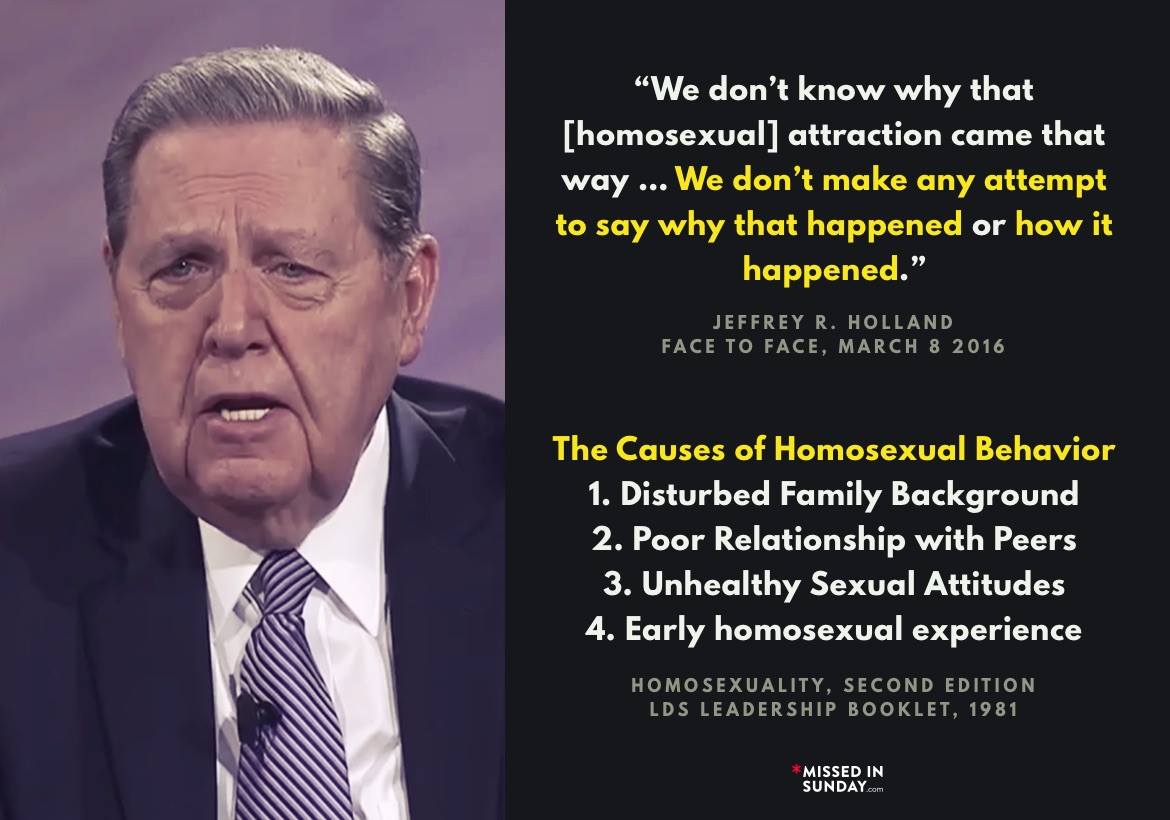Excerpt from a 2016 Face to Face with Jeffrey R. Holland: 1
“We have written, we have publicized, we have talked, we have put articles in Church magazines, about attraction. We do not make a judgment about someone’s attraction. We don’t know why that attraction came that way. And the person doesn’t. The one struggling with it doesn’t. We don’t make any attempt to say why that happened or how it happened.”
Excerpt from a 1981 Booklet Addressing ‘Homosexuality’, published as a guide to be used for local leaders when working with homosexual members: 2
The Causes of Homosexual Behavior
Professionals do not agree on the causes of homosexual behavior. How- ever, most professional research supports the view that homosexual behavior is learned, and is influenced by unhealthy emotional development in early childhood. This explanation is most consistent with what the Lord has revealed concerning the eternal nature of man as the offspring of divine parents.Although there are probably many factors affecting the development of homosexuality, the following elements appear quite consistently:
1. Disturbed Family Background
a) A key factor in the development of both male and female homosexuality seems to be the lack of a warm, supportive, affectionate relationship between the individual and his father. Many times the father is either physically or emotionally uninvolved in his child’s life or is punishing and authoritarian.
b) The mother usually attempts to fill the physical and emotional void left by the father. Some mothers are overprotective and dominant.
c) Because of inadequate parental examples in the home, the child does not learn proper masculine and feminine behavior.
d) The relationship between mother and father is often strained, hostile, and competitive.2. Poor Relationship with Peers
a) The individual sees himself as being different from peers; therefore, he tends to become isolated and lonely.
b) His peers often see him as different, and they label and reject him.
c) The individual often uses homosexual behavior as a way to gain acceptance. Because he needs warmth and love, he is attracted by the apparent acceptance of others who engage in homosexual activities. d) Because he is isolated from others, he does not develop fundamental social skills and attitudes.3. Unhealthy Sexual Attitudes
a) The individual’s parents may view sexual expression as something which is improper or even “dirty.” They may pass this attitude on to their children.
b) The mother may place too much importance on a strong emotional attachment between herself and her son as a result of her efforts to fill the emotional void left by the father.
c) The mother may discourage her son’s interest in girls.
d) The father’s passive or negative relationship with the mother can create a negative attitude in the child about the proper relationships between a husband and wife.
e) Some young people may misinterpret Church emphasis on premarital chastity, completely avoiding heterosexual interests or relationships.4. Early homosexual experience
a) Early homosexual experiences increase the possibility of future homosexual encounters.
b) Early masturbation experiences introduce the individual to sexual thoughts which may become habit- forming and reinforcing to homosexual interests.
c) The first homosexual experience often occurs in early childhood for males, and in late teens or in the twenties for females.
d) The individual is usually introduced to homosexual behavior by someone his own age or a few years older, almost always by someone he knows.
References
| 1 | Face to Face for Young Single Adults with Elder Jeffrey R. Holland (2016) – https://www.lds.org/youth/activities/face-to-face-events/holland?lang=eng |
|---|---|
| 2 | Homosexuality, Second Edition (LDS Manual – 1981) – https://archive.org/details/Homosexuality1981 |

